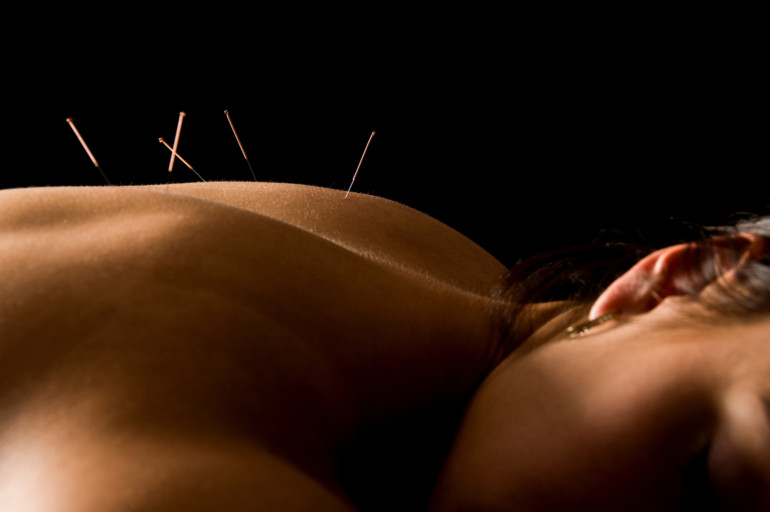Acupuncture has been used for thousands of years in Traditional Chinese Medicine to treat everything from pain to anxiety, insomnia, allergies, and autoimmune disorders by inserting very thin needles into acupuncture points throughout the body. The idea behind acupuncture is to balance the Qi or life force flowing through the meridians of your body, although it can also be said that acupuncture stimulates nerves and connective tissue. While the benefits of acupuncture have not been scientifically proven, it’s becoming a popular holistic treatment for a variety of conditions. “Acupuncture treats the underlying imbalances or root causes of health issues,” explains acupuncturist Kelli Miller, who practices at Strata Integrated Wellness Spa in Colorado Springs, Colorado. “It is a holistic treatment for body, mind, and emotions and can treat issues such as insomnia, stress, depression, anxiety, gastrointestinal issues, reproductive concerns, and headaches.”
If you’re thinking about trying acupuncture for the first time, here’s what you can expect from your first treatment.
1. You Should Consider the Type of Setting You Want
View this post on Instagram
Most acupuncturists work in simple, sparsely decorated clinics. More doctor’s office vibes than spa, but maybe with better feng shui. If you’re looking for a full spa experience, Chuan Spa at The Langham, Chicago (a Best of 2019 winner) is the only luxury spa in Chicago that offers acupuncture, with a master of acupuncture and oriental medicine on staff. In addition to acupuncture, Chuan Spa also offers Traditional Chinese Medicine treatments including cupping, gua sha, and moxibustion. You’ll pay a premium, but you can make a spa day of it relaxing with tea in the Himalayan salt stone sauna and taking a nap on the warm ceramic and marble recliners made in Austria.
2. You Might Talk About Poop.
Unlike a traditional massage, where the therapist will ask how you’re feeling, if you have any injuries, and if there are any areas to avoid, the consultation before your first acupuncture treatment is much more involved. Acupuncture aims to address underlying issues and functioning of organs, not just relieve symptoms. The acupuncturist will look at your tongue and take your pulse, and these data points are used to figure out why you might be feeling a certain way — whether that’s anxious or sluggish, tired or restless. Subtle differences in the coloring, coating, shape, and moisture content of the tongue can indicate things about the digestive system, blood circulation, and blood production.
Your acupuncturist will also ask about your diet, sleep habits, exercise routine, and bowel movements. Women can expect to be asked about their periods. It might feel weird to discuss some of these intimate topics with a complete stranger, but the more honest you are, the more you’re helping the acupuncturist understand all elements of your life and how that might affect your body, your mood, and your Qi.
3. It Won’t Hurt.
Acupuncture shouldn’t hurt. It’s not like laying on a bed of needles, nor like getting a shot. The needles used are much thinner and only inserted about a half inch or inch into the skin.
“Acupuncture needles are only the thickness of a strand of hair, so they are very thin and flexible,” explains Vancouver, British Columbia-based registered acupuncturist Claudia Chen. “An acupuncture needle is about 10 times thinner than a needle used for a vaccination or blood test, and thinner than a sewing needle. It also is inserted into muscle, not into vein as when you are getting blood drawn at the doctor’s office. A lot of people even fall asleep once the needles are in.”
In my experience, I usually feel a light prick when needles are first inserted, but occasionally there will be a more resonating twang. Still not painful, but definitely more noticeable, like they’ve “hit a nerve” so to speak.
“Heaviness, pressure, tingling, and numbness are normal sensations when acupuncture needles are inserted,” Chen says. “The deeper twang or pressure is what acupuncturists call ‘De Qi’, meaning getting the Qi energy flow moving in the body — which is a good thing!”
4. Every Treatment Is Customized.
There are hundreds of acupuncture points throughout the body, and each treatment is customized to the individual and how you are feeling at that particular moment. If a friend has talked to you about their experience with acupuncture, including how many needles were used and the placement of those needles, just know that your experience will most likely be entirely different.
And just because you’ve had acupuncture once doesn’t mean that the next treatment will be similar. Typically needles will be left in for 20 minutes to an hour. Chen warns that leaving needles in for too long might not be good for an elderly person or somebody with a weaker constitution. “Acupuncture stimulates physiological changes like increasing circulation, increased antibodies, and releasing endorphins,” she says. “Too much at once can tire a body out so leaving them in longer is not necessarily better.” Both Miller and Chen say that they might use a couple dozen needles or so on average during a treatment.
For generally healthy people, an occasional acupuncture session to help with sleep patterns or clear energy blockages and stagnation can be good for maintaining general health, but those with more serious health concerns may need to return regularly over a prolonged period of time to see lasting benefits. Chen says that it generally takes at least four sessions to know if acupuncture is something that you will respond to. Like with other aspects of health, prevention is always easier than fixing a major issue or injury.
5. There’s Even Facial Acupuncture.
View this post on Instagram
Cosmetic acupuncture can be a great way to address anti-aging and facial rejuvenation concerns naturally, as opposed to using fillers or lasers. The needles create a micro-trauma in the skin, stimulating the body’s natural responses (collagen and elastin release) to rejuvenate skin cells. Chen says facial acupuncture is less aggressive than lasers, which burn the epidermis.
“There is also little to no risk with cosmetic acupuncture, just mild bruising,” she says. “While microdermabrasion can be more beneficial to resurface the skin and improve texture, I would argue that cosmetic acupuncture can do more for anti-aging. The needles go in and tug on facial muscles that have weakened with age and have caused sagging and wrinkles. Repeated treatments will strengthen muscle tone, kind of like taking your face to the gym.” Chen recommends a series of 10 weekly sessions for those wanting to see anti-aging results, followed by monthly maintenance.
In contrast to full-body acupuncture, Chen uses more needles for facial acupuncture, as many as 40 needles just in the face. In Chicago you can try facial rejuvenation acupuncture at Exhale Spa.
 Amber Gibson spends 340 nights a year in hotels searching for the latest and greatest in the travel industry. Her writing and photographs have appeared in print, online, and on the radio for outlets including Four Seasons Magazine, NPR, Saveur, Departures, Rhapsody, Hemispheres, American Way, Private Air, Wine Folly, Plate, Chicago Magazine, Tasting Table, and Serious Eats. She graduated as valedictorian from Northwestern University’s Medill School of Journalism and received a fellowship to attend the 2017 Wine Writers Symposium at Meadowood Napa Valley. Champagne, dark chocolate, and gelato are her biggest weaknesses. She also admires and supports CAASE in Chicago. Follow her adventures on Instagram and Twitter.
Amber Gibson spends 340 nights a year in hotels searching for the latest and greatest in the travel industry. Her writing and photographs have appeared in print, online, and on the radio for outlets including Four Seasons Magazine, NPR, Saveur, Departures, Rhapsody, Hemispheres, American Way, Private Air, Wine Folly, Plate, Chicago Magazine, Tasting Table, and Serious Eats. She graduated as valedictorian from Northwestern University’s Medill School of Journalism and received a fellowship to attend the 2017 Wine Writers Symposium at Meadowood Napa Valley. Champagne, dark chocolate, and gelato are her biggest weaknesses. She also admires and supports CAASE in Chicago. Follow her adventures on Instagram and Twitter.

